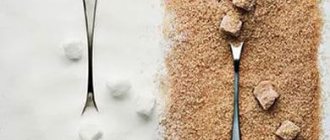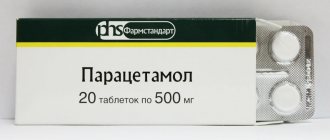Problematic functioning of the gastrointestinal tract is a common occurrence in mothers after childbirth, both during natural birth and during cesarean section. Over time, the body will recover, and to help it, you need to adhere to a healthy diet and increase the number of water intakes.
If delayed bowel movements (constipation) continue for more than three days and are aggravated by unpleasant and undesirable properties: pain and bloating, then the option of using laxatives for breastfeeding mothers should be considered. Before using medications, you need to find out what causes problems with the digestive system.
Causes of constipation after childbirth
Many people believe that disruption of the digestive tract only occurs during pregnancy, and that after childbirth everything returns to normal. But in fact, this rarely happens; after the birth of a child, most women continue to suffer from constipation. There are many reasons for this:
- compression of the intestines or changes in the position of its loops under the pressure of the uterus during pregnancy;
- weakening of the perineal muscles as a result of childbirth;
- sedentary lifestyle;
- fear that the stitches will come apart during defecation.
Often a woman who is breastfeeding does not eat properly because she is afraid of provoking an allergy in the child. Errors in a mother’s diet can also be associated with stress or lack of time. These reasons, as well as the consequences of surgical intervention or difficult childbirth, lead to the development of atonic constipation, in which intestinal motility is weakened. This condition is accompanied by decreased appetite, increased gas production, and slowed digestion. And under stress, spastic constipation often develops, caused by spasm of the smooth muscles of the intestines.
What are the causes of constipation in a nursing mother?
Weakened abdominal muscles, a reluctance to push, associated with childbirth and pain are the most common, but not the only reasons.
Other factors include:
- Unbalanced diet
- Postpartum depression
- Lack of physical activity
- Weakening of muscles due to caesarean section
- Hormonal imbalance or body restructuring
- The use of special medications before childbirth that can slow down digestion
A young mother should know the types of constipation, there are only two of them:
- Atonic constipation caused by weakness of the intestinal muscles. It occurs due to surgical use. The condition of the body is accompanied by nausea, lack of appetite, gas formation and colic in the abdomen.
- Spasmodic constipation. It comes due to weak bowel function, accompanied by bloating, pain in the left side of the abdomen and restlessness.
After the process of breastfeeding, it is not always possible to quickly overcome psychological deviations. Here you should look at harmless, popular drugs: drops, suppositories, capsules, natural remedies.
Why you need to treat constipation
This condition greatly affects the woman’s general well-being and can affect the quality of breast milk. If the bowel movement process is disrupted, a woman experiences abdominal pain and increased gas formation. Due to decreased appetite and slow digestion, a lack of essential nutrients develops, which leads to weakness, headaches, and insomnia. The condition of the woman’s skin and hair worsens, and bad breath appears. With prolonged and frequent constipation, a woman may develop hemorrhoids or anal fissures, which cause serious suffering.
This condition of a nursing mother also affects the quality of breast milk. It becomes less nutritious and contains few microelements necessary for the child’s health.
How to cope without medications
When a woman consults a doctor with a question about whether a laxative can be used while breastfeeding, most experts recommend trying to cope with the problem without medication. Often no special medications are required, you just need to eliminate the causes of constipation. To do this, a woman is recommended to establish a daily routine, try to move more, and avoid stress. Adequate drinking regime is also important - you need to drink at least 2 liters of clean water.
In addition, it is recommended to add laxative products to your diet. When breastfeeding, this is the safest way to get rid of constipation. Dried fruits, beets, figs, apricots, pumpkin, and watermelon have the greatest laxative effect. It is useful to eat whole grain bread with bran or buy bran separately and add it to food. A woman’s diet should also include oatmeal, olive oil, flaxseeds, and fermented milk products. But you can only eat natural yoghurts without additives and fresh one-day kefir. Other products will not provide a laxative effect. You should also try to consume less rice, tea and coffee, crackers, cookies, and fast food.
Nutrition and folk remedies
All nutritional recommendations to obtain a laxative effect can be contained in the following rules:
- A maximum of vegetables in any form (raw, boiled, baked, stewed).
- Maximum fruits in any form.
- At least two liters of fluid per day (unless there is swelling and special instructions from the doctor).
- Avoid industrially produced products with preservatives, stabilizers, taste improvers and various e-additives (sausages, sausages, sweet yoghurts, baked goods and confectionery).
Give preference to natural meat, chicken, vegetables, and homemade baked goods. By the way, you can even bake the famous Maria cookies at home yourself.
The article on the best recipes for dishes during breastfeeding, which will delight any mother, is very popular on the blog. I recommend reading, cooking and trying new recipes.
The following products can have a laxative effect:
- Fresh one-day kefir of normal fat content (2.5-3.2%). This is important because two- and three-day kefir, on the contrary, can have a strengthening effect on the intestines. 1 glass per day on an empty stomach or an hour after meals.
- Prunes, poured with boiling water and slightly soaked, 4-5 pieces, 2-3 times a day. Can be combined with kefir.
- Very ripe pears (the soft variety, not the hard green variety). 1-2 pieces per day.
A variety of teas and herbal infusions should be taken very carefully, after consulting with your doctor. Often folk remedies are not at all harmless, and can penetrate into mother’s milk and even have a harmful effect on the baby.
In addition, the effectiveness of most teas and infusions is extremely low compared to medications and certain foods.
Medicines for the treatment of constipation
Only a doctor can determine which laxative can be taken while breastfeeding without fear of harming the baby. He takes into account the type of constipation, its cause and the general health of the woman. In addition, there are several groups of drugs for constipation, which are divided according to the nature of their effects and method of administration:
- Stool softening medications may be taken orally or delivered to the intestines as an enema. They are made on the basis of petroleum jelly or macrogol.
- Drugs that increase the volume of feces affect intestinal motility and promote rapid emptying.
- Contact laxatives are not recommended during breastfeeding. They act on the receptors of the intestinal walls, stimulating its work, and can cause colic in the child.
- Osmotic laxatives are often used. By preventing the absorption of water, they improve bowel movements.
- The safest laxatives for breastfeeding are local remedies: enemas or suppositories.
How to restore stool after childbirth for a nursing mother
If a woman experienced constipation before pregnancy, she will experience it again during breastfeeding. The reasons are the structural features of the large intestine and the application of sutures to the perineum. As it passes through the intestines, stool loses moisture and becomes hard, making it difficult to remove. Diet, exercise, and taking herbal decoctions or laxatives will help improve bowel movements.
How to treat constipation during breastfeeding with a diet
To normalize bowel movements, you can adjust your diet and introduce fiber-rich foods into your diet, which will help soften hard masses. You can relieve constipation by eating the following foods:
- oatmeal, millet cereal, muesli;
- whole wheat bread;
- sunflower, olive oils;
- pumpkin, beets, red vegetables;
- apples, plums;
- dairy products;
- dried fruits.
Exercises for constipation
A simple way to normalize the intestinal function of the mother of a newborn is to carry out special exercises. Physical exercise restores tone to the abdominal muscles and intensively helps contract the uterus. Every day you need to do the following workout:
- Lie on your back, bend your knees, inhale.
- Inflate your stomach as much as possible and hold this position for 3-4 seconds.
- Exhale through your mouth, draw in your stomach.
Stool softeners
Such products have a gel-like consistency, sometimes they are liquid. The active ingredient of such drugs is petroleum jelly or macrogol. The most well-known drugs that soften stool are vaseline oil for oral administration, almond oil, and glycerin. During lactation, you can also use Forlax powder or use Norgalax microenema. All these drugs are not absorbed into breast milk; they act at the level of the small intestine.
The mechanism of action of such drugs is that they soften stool, thereby facilitating their removal from the intestines. During lactation they are not contraindicated, but they should not be used often, as they can lead to a decrease in intestinal motility.
Increased stool volume
Such drugs, entering the intestines, swell in it, stimulating the receptors of its walls. This promotes the activation of peristalsis. Such drugs are not digested and therefore do not pass into breast milk. Such remedies are indicated for atonic constipation, but it is not recommended to take them for a long time, as they can cause a feeling of heaviness and bloating.
Drugs that increase the volume of feces include products based on flax seeds or psyllium seeds. These may be the drugs “Naturolax” or “Mukofalk”. Whole flax seeds, figs, and seaweed also have a similar effect.
Local remedies
When answering the question about what kind of laxative a mother can use while breastfeeding, the doctor most often recommends suppositories or microenemas. They are now easy to buy in pharmacies, they are easy to use and effective. Their safety is explained by the fact that they act only in the area of the large intestine, without penetrating into breast milk.
Most often, two products are recommended for nursing mothers: glycerin suppositories and Microlax microenemas. Their peculiarity is that they have a complex effect: they soften feces, facilitating their removal from the intestines, and also act on its walls, stimulating peristalsis. Glycerol suppositories, as well as Norgalax microenemas, have a similar effect. It is contraindicated to use such drugs for hemorrhoids, fissures in the anus, and inflammation of the rectum.
Other laxatives
The most common laxatives are saline or osmotic. They interfere with the absorption of water in the intestines and also attract fluid from the plasma. This helps soften stool, increase its volume and stimulate intestinal motility. But most of these drugs are not recommended to be taken during lactation. For example, saline laxatives are absorbed into breast milk and can make it taste bitter. This is Earlvar salt, magnesium sulfate, magnesium hydroxide.
What other laxative can you take while breastfeeding? Prebiotics based on lactulose or lactobacilli are most often recommended. This could be “Hilak Forte”, “Linex”, “Lactobacterin”. They normalize the intestinal microflora, making it easier to empty.
Allowed laxatives
To solve the problem, it is important to review the diet - introduce more fiber, liquid dishes, and fresh dairy products. You should avoid stress and be less nervous. Laxatives during breastfeeding are prescribed by a doctor if constipation is present for more than three days.
Softening
A laxative with a softening effect has a liquid structure, helps to liquefy stool and removes feces. The category of such products includes petroleum jelly and Norgalax gel. The use of drugs during lactation is regulated by a doctor.
Swelling
A drug with a swelling effect when it enters the intestines increases the volume of bowel movements and causes a natural urge to defecate. Permitted are:
- Nutrolax is a powdered product, diluted with water - 250 ml of warm water per spoon of the composition. Take 3 times a day for 2-3 months.
- Mucofalk - before use, dissolve in 100 ml of water, drink up to 3 times a day until the disorder is completely eliminated.
Constipation is not an independent disease, it is a symptom of a disorder of the digestive tract or nervous system. It is important to consult a specialized doctor before using medicinal laxatives.
One of the most common laxatives for breastfeeding is Mucofalk with orange flavor.
Osmotic
Laxatives of this type retain fluid in the intestines and painlessly remove feces from the body. Permitted osmotic agents for hepatitis B:
- Duphalac - the active ingredient - lactulose - is not absorbed into the intestines and causes a laxative effect. Within 15 minutes after using the syrup, a natural urge to go to the toilet occurs, and a painless act of defecation occurs. Indicated for young children.
- Forlax - the components of the drug do not penetrate into the blood and breast milk, the drug stimulates intestinal motility, eliminates spasmodic pain during difficult bowel movements.
- Importal - passes through the small intestine with minimal absorption, and in the large intestine it is metabolized, increases the water content in the stool and provokes painless bowel movements.
- Prelax - available in the form of syrup, can be used on an ongoing basis. For breastfeeding, it is recommended to take 20 ml 1-2 times a day, on an empty stomach or 6 hours after meals. The active ingredient of the drug is lactulose. The drug accumulates in the body, and with each subsequent dose it is recommended to reduce the amount of the drug product.
The dosage during lactation is prescribed only by a doctor. Taking laxatives for a long time is prohibited; it is important to direct the body’s work to eliminate the cause of the disorder.
Whatever laxative you choose, you need to remember that constipation is not an independent problem, but a symptom of another disease, and it is necessary to establish the true cause of its occurrence.
Contact means
Among the approved contact agents for hepatitis B, Sennalax and Glaxenna are used. Guttalax drops should be taken with caution. The dosage and duration of treatment is determined by the attending doctor.
Rectal suppositories and microenemas
A popular remedy for mother and child is glycerin suppositories. They are safe for regular use and are inserted into the anus once a day, after meals, preferably 2-3 hours before bedtime.
Laxative microenema "Microlax" eliminates both forms of defecation disorders. The drug allows you to soften feces, creating a water shell around them. Subsequently, the act of defecation is painless. The microenema is effective 5 minutes after use. One of the best remedies as an emergency aid for breastfeeding and pregnancy. The product cannot be abused, since an enema is not a means for frequent use.
It is worth remembering that the drug will be useless if constipation occurs due to organic and functional disorders of the large intestine. It is important to undergo appropriate treatment to eliminate this symptom of the disease.
In order for the intestines to function smoothly, it is necessary to introduce foods rich in dietary fiber into the diet. These are fruits and vegetables, dried fruits, bread made from rye flour, buckwheat, oatmeal, barley porridge, dietary meat, low-fat dairy products.
For constipation, it is important to exclude coffee-containing drinks, strong tea, bread, baked goods made from white flour, rice, nuts, semolina, and hard cheeses. It is useful to take daily walks in the fresh air and exercise moderately.
Regular clean water stimulates intestinal function and improves intestinal motility. It is necessary to drink a glass of liquid on an empty stomach and 30 minutes before eating.
Your doctor will tell you which laxative to choose when breastfeeding. It is necessary to maintain a drinking regime, eat a balanced diet, avoid stress and not self-medicate.
What laxative can you use while breastfeeding?
Many medications for constipation are taken orally. They enter the stomach and, passing through the digestive tract, are absorbed into the bloodstream. In this case, all components of these drugs can pass into breast milk. Moreover, they can not only change the taste of milk, but can also harm the child. Therefore, not all laxatives can be taken while breastfeeding. Usually only those that are safe for the child and act quickly are recommended. Among all the drugs intended to treat constipation, only a few meet these requirements:
- Preparations containing lactulose syrup are most often recommended at this time. This laxative is often used for newborns. When breastfeeding, it helps to establish intestinal microflora and speed up bowel movements. Moreover, it is not addictive and has no side effects. Lactulose syrup is produced under the names “Duphalak”, “Prelax”, “Portalak”, “Normaze”.
- Macrogol-based drugs are also often used, for example, Forlax or Tranzipeg. This is a chemical that increases the volume and softens the stool, which promotes faster bowel movements.
- Sometimes a mother needs such a laxative when breastfeeding so that it works quickly. In this case, it is recommended to use glycerin suppositories. They are absolutely safe for the child and act within 3-5 minutes. They are used only as needed to facilitate bowel movements.
Traditional methods
If the situation has not yet reached a critical point, then you can use traditional methods in the fight against constipation. Many of them are also suitable for preventing constipation and other intestinal problems.
First of all, you should establish proper nutrition. You should not get too carried away with diets for nursing mothers, unless there is a medical indication for it - reducing the diversity of the diet and removing many foods from it has a negative effect on intestinal function. When the first signs of constipation appear, you should add dried apricots, prunes, watermelon, pumpkin, beets, and carrots to the menu.
Prunes - a natural remedy for constipation
The amount of liquid you drink per day should not be less than 2 liters - a lack of water negatively affects not only the gastrointestinal tract, but also the amount of breast milk.
Physical activity, especially in the morning, helps improve the functioning of all internal organs of a woman, including those responsible for processing and removing food.
Emotional calm also plays an important role in the prevention of constipation, and also improves lactation and strengthens the general well-being of the mother.
Folk laxatives - decoctions of various remedies - are effective and easy to prepare, but you should consult your doctor before using them, as they can affect the baby if they pass into breast milk. Here are some recipes:
- take a teaspoon of anise, dill, caraway seeds, pour 500 ml of boiling water and leave in a thermos overnight; take a tablespoon before meals;
- mix in equal parts anise, mint leaves, chamomile flowers, valerian roots, dried nettle and strawberry leaves; Pour 2 tablespoons of the mixture into 500 ml of boiling water, leave in a thermos for at least 8 hours; take a tablespoon before meals;
- pour a teaspoon of flax seeds into 200 ml of boiling water, leave in a thermos for at least 5 hours; take on an empty stomach.
Video: Doctor Komarovsky - “how to eat to avoid constipation”
What drugs should you not take?
Doctors do not recommend immediately starting to take medications if constipation occurs. Any laxatives during breastfeeding can have a negative effect on the body of both mother and baby. Even the safest products are often addictive. They can also lead to abdominal pain and flatulence. In addition, any medicine is an emergency remedy. It is recommended for use when constipation lasts a long time, for example, there is no stool for more than 3 days, and this leads to pain and discomfort. In other cases, it is recommended to start with changing your diet and eliminating the causes of constipation.
In addition, among laxatives there are those that are not recommended for nursing mothers to use. First of all, these are preparations containing senna extract. They can be produced under the names “Senadexin”, “Glaxena”, “Senade”, “Sennalax”. These drugs act on intestinal receptors, but are absorbed into breast milk. Senna can cause colic in a child. In addition, mothers are not recommended to take drugs such as Fortrans, Regulax, Bisacodyl and Picolax. They can be dangerous for the child. And “Swedish Bitters” and “Chitosan” can make milk bitter.
Natural laxatives
To treat constipation, some nursing mothers use herbal remedies. But they should be used after consultation with a doctor and very carefully, as they can cause allergies in the child. When breastfeeding, laxatives based on herbal ingredients should contain only herbs that are safe for the baby. Most often, it is recommended to brew infusions containing anise, cumin, nettle, dill seeds, fennel, and mint leaves. You can use the following recipes:
- Boil figs in milk, take a tablespoon several times a day;
- drink half a glass of decoction of anise, fennel and caraway seeds;
- drink prune decoction in the morning;
- Make a gooseberry decoction - a tablespoon of berries per glass of water.
Non-drug ways to cope with constipation
Women during lactation should avoid taking medications containing substances that can harm the baby's health. It is better to start the fight against constipation by making adjustments to your diet, adding vegetables and fruits to it. Please note: new foods or herbal teas should be introduced to the menu carefully, monitoring the child’s reaction, as allergies may occur.
Products with a laxative effect include: plum, beet, carrot, apricot, watermelon, zucchini, pumpkin. It is useful to eat fermented milk products, spinach, bread with bran, or simply ready-made bran sold in a pharmacy or health food store. Oatmeal and vegetable oils will also help (it is better to use olive oil).
Dried fruits, primarily prunes, can also be used as a mild laxative - infusions or decoctions are prepared from them. Gooseberries and figs are also used to prepare laxative infusions.
You can resort to herbal medicine, but herbal preparations must be prescribed by a doctor, since they contain active ingredients that can affect lactation or cause allergies in the child. To treat atonic constipation, an infusion of a mixture of cumin seeds, anise and fennel (in equal proportions) is used. A herbal mixture containing stinging nettle, peppermint leaves, anise seeds and valerian root will help in the fight against spastic constipation.
It is recommended to minimize the consumption of foods that impair intestinal motility, these include rice, animal fat, chips and crackers, drinks containing caffeine, and strong tea. Completely eliminate fast food from your diet - it is poorly digested and lingers in the gastrointestinal tract for a long time.
For mothers suffering from constipation, it is important to drink more fluids - 7-9 glasses of clean still water, weak tea, juices. But if you are prone to edema or hyperlactation, the amount of fluid must be limited.
Laxative during breastfeeding: reviews
Many young mothers have to struggle with constipation; not all of them consult a doctor about this. Some take medications based on reviews from other women. The main thing is not to take medications that are absorbed into breast milk, so as not to harm the baby. The most positive reviews are about the drugs Duphalac, Prelax, and Normaze. They are absolutely safe for the child and effectively help cope with constipation. The main thing is not to take such drugs often, so as not to disrupt intestinal motility. Therefore, doctors recommend taking medications periodically, and the rest of the time to cope with constipation with proper nutrition.










